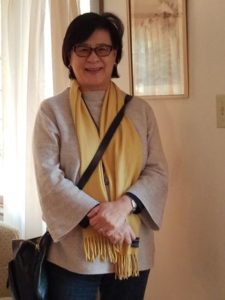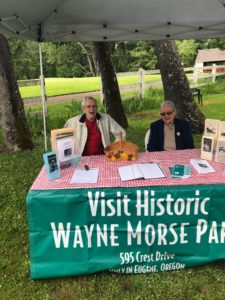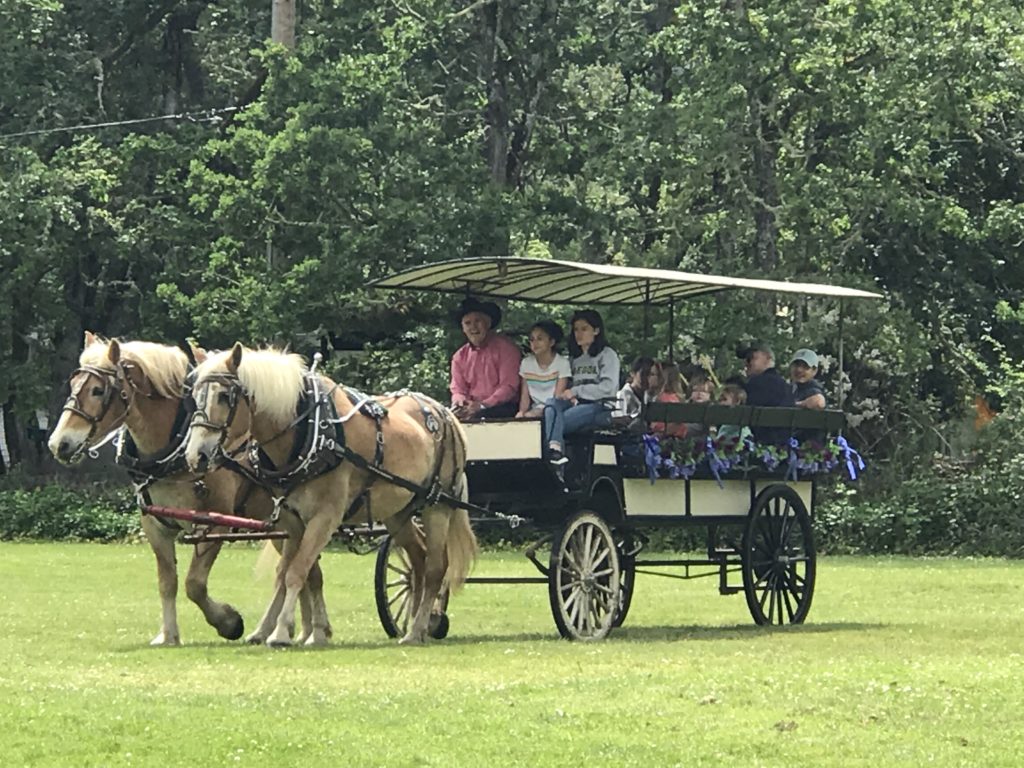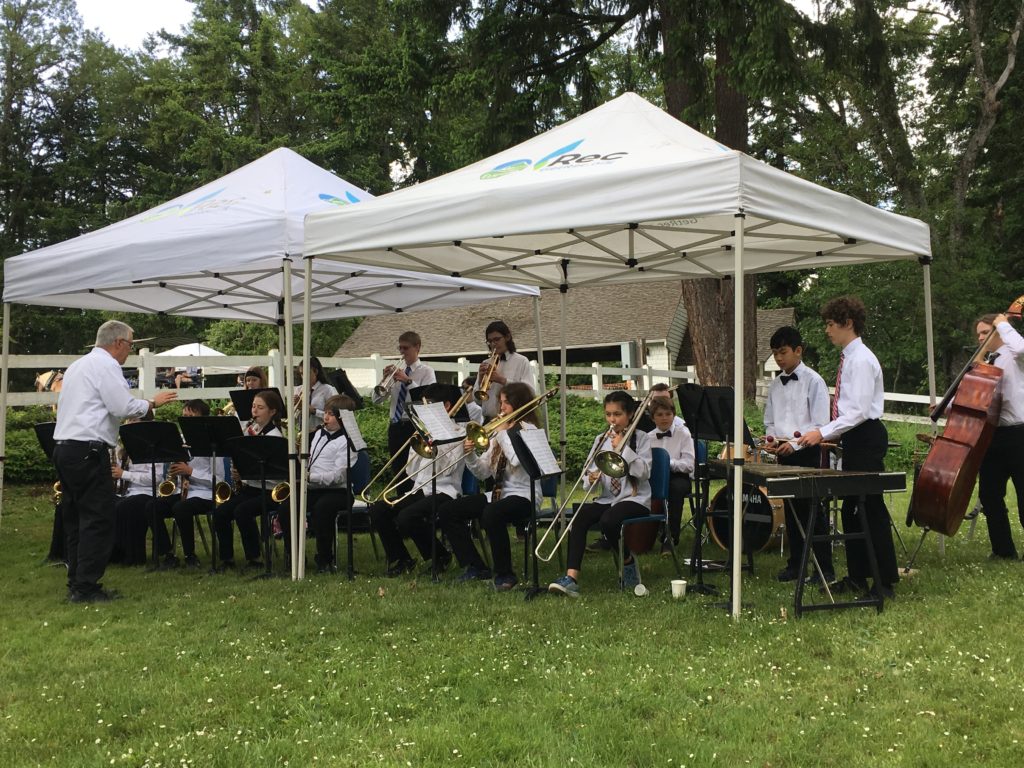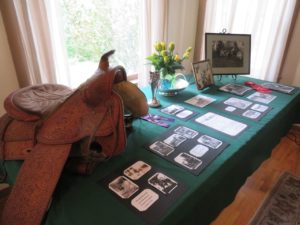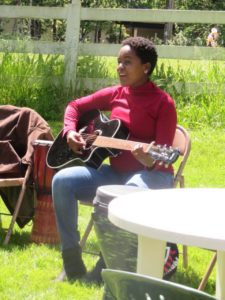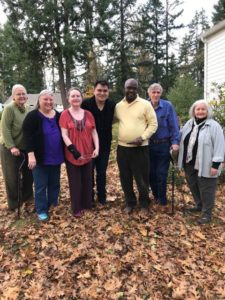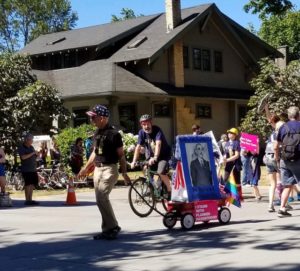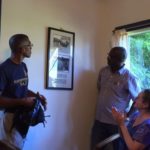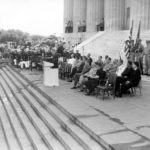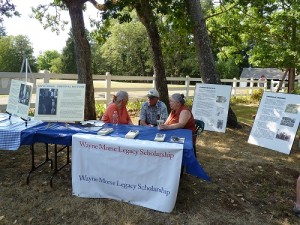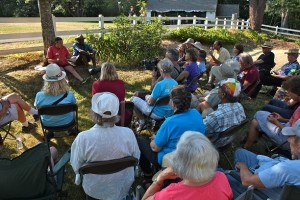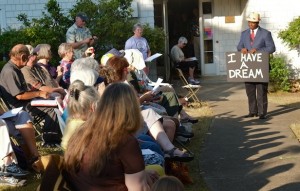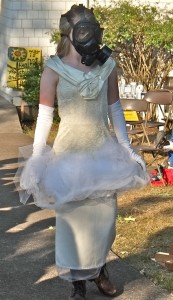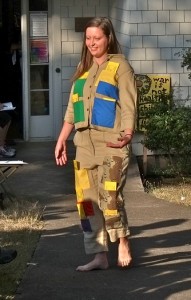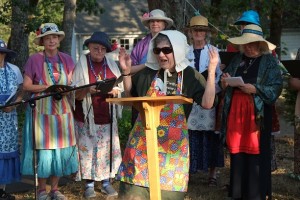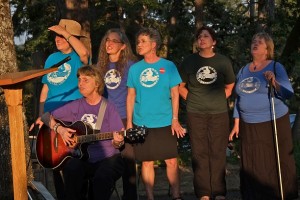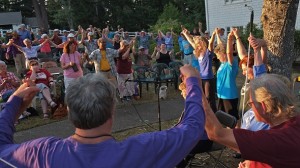CELEBRATING HISTORIC PRESERVATION 2023
Following a 3-year absence, the Morse Family Farm again celebrated Historical Preservation Month with an Open House in May 2023. House tours, a family wedding dress, ice cream and cake, carriage rides, together with lively music were a welcome and uplifting tonic for these times; radiating good will and a sense of community as well as showcasing Wayne Morse’s principled public service.
Melanie Lee, Senator Morse’s eldest grandchild, greeted guests in the house. “It warmed my heart to see old friends. Meeting new guests to the Farm who have interest in the history of Wayne Morse and the house was encouraging. Thank you everyone for honoring Wayne Morse’s historical legacy and my family.”
We’re grateful to Ladonna and Larry Chafin of Chafin Farms Carriages, Josh Dillow and the Monroe Middle School Jazz Band, Prince Puckler’s Ice Cream, and Rhythm and Blooms for contributing to the afternoon’s success. A special thanks to Shelton McMurphey Johnson House for the loan of the Morse family wedding dress from their collection of antique wedding dresses. We look forward to the next celebration in May 2024!
Statement of Support
George Floyd, Breonna Tayler, Ahmaud Arbery – the latest names on a tragic and growing list of Black Americans who have lost their lives to systemic racism.
Eugeneans and Oregonians have taken to the streets – with their brothers and sisters across our Nation – to decry the fatal outcomes from pervasive racial injustice and inequality. We stand with them and call upon local, state and national leaders to wipe out systematic racism and bring about justice and equality for all.
From his earliest days in the United States Senate, Wayne Morse worked to deliver this Nation’s freedoms and constitutional guarantees to its Black citizens and decried the brutality against their struggle. He was a Vice President and Board Member of the National Association for the Advancement of Colored People for over 20 years. He joined the 1963 March in Washington for Jobs and Freedom, which he celebrated as the greatest public demonstration he’d ever seen. “One which brought together people from every corner of America and from all walks of life for a common purpose.”
Today we are witnessing August 28, 1963, repeated every day on streets in cities and towns throughout America.
Wayne Morse commended the 1963 marchers: “This was not a mob organized to intimidate Congress. It was a section of America exercising its right under the Bill of Rights peaceably to assemble and petition for redress of grievances.” He charged, “The Congress of the United States is now on trial.” He chastised his colleagues for being too concerned with the revolution of rising expectations abroad while “ignoring and suppressing a revolution of rising expectations here at home.”
Today Wayne Morse would be marching again and calling on all Americans to stop ignoring the systematic racism and injustice which inflict our Nation.
Today Wayne Morse would charge that not only Congress, but all our governmental and societal institutions, are on trial.
We look to Wayne Morse’s principled voice as a guide to our work at his Farm. We will continue to explore more fully how his legacy can afford answers to the struggles and problems we face today.
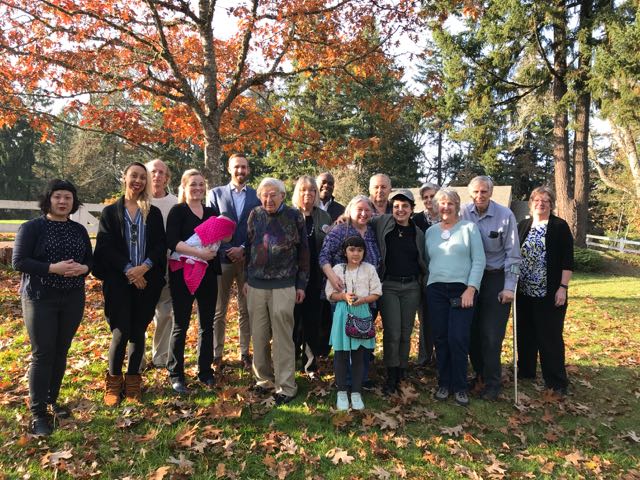
The WMHPC Board celebrating Wayne Morse Legacy Scholarship recipients past and present in the Fall of 2019.
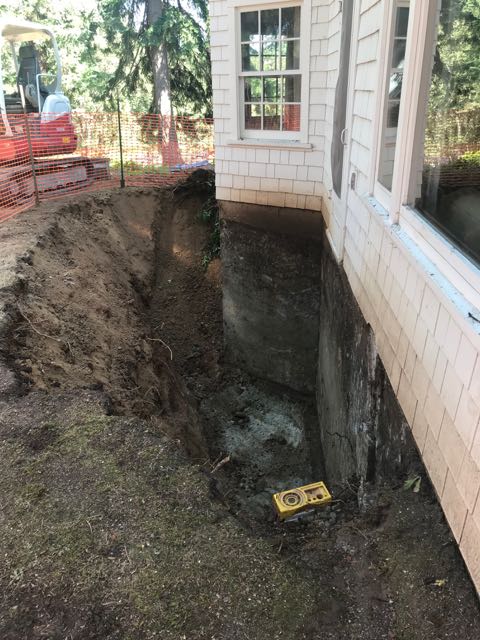
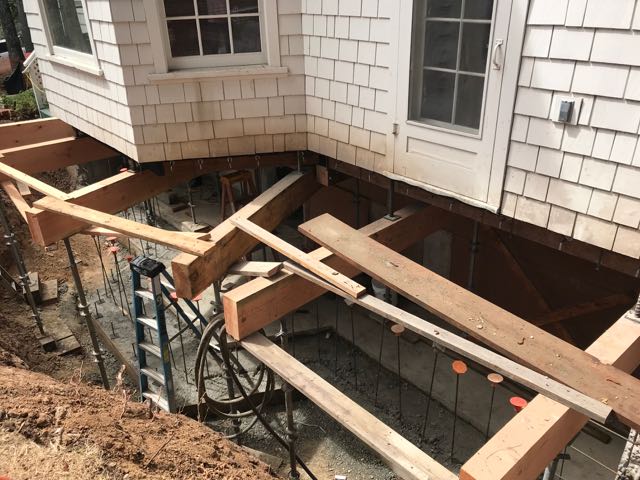
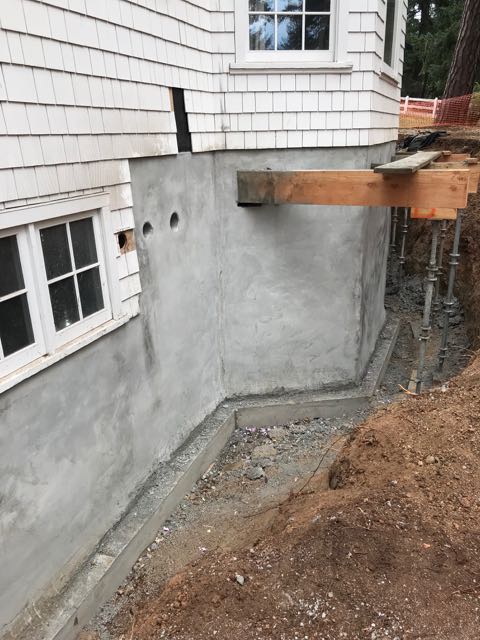
Farm Repairs
A crumbling foundation and moisture issues in the basement and display room led the City of Eugene to a major repair project at the Morse family home in summer 2019.The foundation under the living and dining rooms and the kitchen was replaced; the entire foundation waterproofed; and a new drainage system placed around the foundation. Care was taken to replicate historic landscaping and to save Douglas firs and ponderosa pines impacted by the project. Concern with interior air quality and dust from the construction led to a thorough cleaning of interior spaces and heating ducts.
Repairs also were undertaken at the Park Picnic Shelter, damaged when a large oak fell during a heavy snow storm in February. The Wayne Morse Summer Day Camp which normally uses the Shelter carried on under a large tent, with campers enjoying adventures on the large pieces of the downed oak which remain adjacent to the Shelter. These pieces of oak may be used in apossible future nature play area at the Farm.
Wayne Morse Chairs of Law and Politics Meet With Board
During 2019, two occupants of the Wayne Morse Chair for Law and Politics at the University of Oregon visited with our Board. In March, Mae Ngai, the 2018-19 Chair, joined the Board for a discussion of the relationship between the labor movement and immigration in the United States. Ngai is the Lung Family Professor of Asian American Studies and a professor of history at Columbia University. Her research focuses on immigration, citizenship, and nationalism.
Later in October, Dr. Lucy Jones, the 2019-20 Chair, also known as known as the “Earthquake Lady,” discussed her work building links between community and science and increasing communities’ ability to adapt and be resilient to the dynamic changes of the world around them.She is the founder of the Dr. Lucy Jones Center for Science and Society, and a research associate at the Seismological Laboratory of Caltech.
Annual Open House
Fun was had by all at the 2019 Historic Preservation Open House at Wayne Morse Family Farm on Sunday, May 19th. Visitors enjoyed historic house tours, exhibits, Chafin Farms Horse Carriages, performances by the Spencer Butte Middle School Jazz Band, and an ice cream social.
Summer Display at the Eugene Public Library 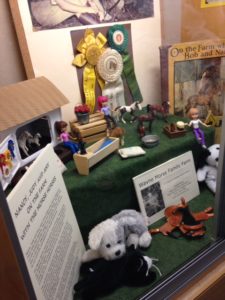
WMHPC’s Summer 2018 display about life at Wayne Morse Family Farm entitled – Nancy, Judy and Amy on the Farm with the Morse Horses – ran for 6 weeks at the Eugene Public Library in the first floor children’s section.
Fun, child-friendly miniatures, ribbons and awards, family photos, stuffed animals and books showed visitors how much the family loved and cared for their horses and ponies which they rode all over the South Eugene hills. The whole family knew how to ride horses well enough to win show and racing competitions at the County and State Fairs. The family’s Edgewood Farm provided lots of quiet and serene corners to have uninterrupted reading time –plenty of time to read about horses. Click on the image above to enlarge.
2018 Open House and New Exhibits
Edgewood Farm was at its best for the Annual Historic Preservation Open House on May 20. The green manicured grounds of the Morse family home and the newly mown adjacent former horse and Devon cattle pastures welcomed guests for house tours, our traditional ice cream social, and music by Not Applikable and the Invisible Arts Project.
In the exhibit room new displays about Wayne Morse debuted. Wayne Morse Fierce Independent focuses on cartoons from the Senator’s political cartoon collection and discusses his independence, his commitment to put principle above politics and his switching parties. Making Democracy Work: Wayne Morse, the NAACP and Civil Rights explores the Senator’s long relationship with the NAACP and his efforts to bring the rights and privileges of the Constitution to the Black citizens of our nation. Featured in the latter are his 1947 remarks to the NAACP at the Lincoln Memorial, where President Truman gave the first address by a U.S. President to the NAACP, and his Report to Oregon after he participated in the 1963 March on Washington and sat on the steps of the Lincoln Memorial to hear Dr. Martin Luther King, Jr., and other civil rights leaders. These exhibits will remain on view for the next year.
A temporary display appeared upstairs on the Morse family dining table about the Morse family’s love of horses and the Senator’s award winning favorite horse, Spice of Life. Featured was one of the Senator’s saddles which recently came to the WMHPC from Amy Morse Bilich, his youngest daughter, and her family.
A very special thanks to Prince Puckler’s for providing the afternoon’s ice cream.
Some features of the 2018 Morse Open House: display of Morse’s saddle and historical photos family horses and performance by Rati Dangarembwa of the musical group Not Applikable.
Jose Antonio Vargas: Morse Chairholder, Undocumented Immigrant
Jose Antonio Vargas, the 2017 Wayne Morse Chair of Law and Politics, attended the WMHPC November Board meeting. A journalist, Vargas’ work with a Washington Post reporting team won the 2008 Pulitzer Prize for breaking news. Since he revealed his undocumented immigrant status in a 2011 New York Times article, he has also become a documentary filmmaker and political and social movement builder. Ellen Herman, co-director of the UO Wayne Morse Center for Law and Politics, indicated that during Vargas’ month at the UO he was busy interacting with students, faculty, and community members — in both Eugene and Portland — who work on undocumented immigrant rights issues.
Vargas discussed the challenges of building his organization, Define American. Its platform “. . . uses the power of story to transcend politics and shift the conversation about immigrants, identity, and citizenship.” The only way to make the issue relevant is to include more people in the narrative. To that end, an important effort is bringing not only Latinos and Asians but Native Americans and African Americans into the immigration discussion. Additionally more people working for undocumented immigrant rights need to appear on Fox News as well as in Tea Party and Chamber of Commerce programs. Vargas himself has appeared many times on Fox News.
Vargas feels a strong responsibility to tell America’s real story. He finds simplistic stories that often inform our view of each other especially troubling. For many people, exposure to immigrants and people of color largely comes through news media and TV. Vargas has focused on creating a language of migrant rights and human rights and presenting the DACA (Deferred Action for Childhood Arrivals) issue with truth and compassion.
Commemorating Wayne Morse
July 30, 2017, was a day for celebrating Wayne Morse.
Click photos to enlarge: (L) Congressman Peter DeFazio with the Morse signboard during the Eugene Parade, (C) Unveiling the photo plaque at the Mims House (Eric Richardson, Johnny Earl, Melanie Lee), (R) Wayne Morse speaking at the Lincoln Memorial, June 29, 1947. Photo courtesy of Harry S. Truman Library & Museum. Abbie Rowe, National Park Service, Photographer.
In a morning parade through downtown Eugene, he was a presence on a red wagon pulled by US Congressman Peter DeFazio. A large early photo of Morse adorned a sign board in the wagon. A less formal mode of transport for Morse who in the 1930s with his family often participated in the Eugene Pageant and Oregon Trail Celebration driving a carriage pulled by one of his horses.
Later in the day at the historic Mims House on High Street, a crowd gathered to recognize Wayne Morse’s long service for the National Association for the Advancement of Colored People. From his earliest days in the Senate, Morse stood with the NAACP to find justice for the disadvantaged Black citizenry in this nation. This came from a Senator who represented a state with less than one percent of Black Americans living in it. He joined the NAACP in 1946 and went on to serve for over 20 years on its Board of Directors and as a National Vice President.
The afternoon program, emceed by WMHPC President Johnny Earl, celebrated how one person can make a difference in the lives of many. Speakers included Congressman DeFazio; Melanie Lee, Senator Morse’s eldest grandchild; Eric Richardson, Eugene-Springfield NAACP President; Eugene Mayor Lucy Vinis; former Mayor Kitty Piercy; State Senators James Manning and Floyd Prozanski; and Juine Chada reading a letter from United States Senator Ron Wyden
A photo plaque recognizing Morse’s commitment to the NAACP and the cause of civil rights was unveiled at the local NAACP office in the Mims House. It features two photos from the Closing Session of the 38th Annual Conference of the NAACP held at the Lincoln Memorial in Washington, D. C., on June 29, 1947. In one photo, Morse speaks to the Conference which also heard remarks by President Harry S. Truman, the first American President to address the NAACP, and former First Lady Eleanor Roosevelt.
The plaque together with an accompanying album containing copies of the Senator’s 1947 speech, “Making Democracy Work,” and his Report to Oregon following the August 1963 March on Washington for Jobs and Freedom offer future generations the opportunity to see that one doesn’t have to be a person of color to fight against injustice to others. Forty three years after his death Senator Morse remains a mentor for all Oregonians.
For the text of Senator Morse’s 1947 speech click here, and for the September 1963 Report to Oregon click here. For an article regarding the NAACP celebration which appeared in the Eugene Register Guard, click here.
In Memoriam: 2015
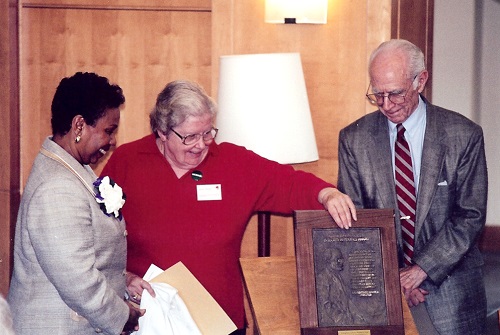
Laura Olson
This past April, WMHPC Board Members joined an overflow crowd in Walterville to celebrate the life of one of our most dynamic Board leaders, Laura Olson. Board Officers spoke during the program, and our special WMHPC display honored Laura’s exceptional leadership and service.
In 1982, Laura joined our Board. Her considerable knowledge of Oregon history and politics as well as her long experience on the staffs of United States Senator Ernest Gruening and members of Oregon’s Congressional Delegation provided invaluable insight for our Board’s work. She served for 12 years as either our Board President or Vice President.
Laura’s commitment to integrity and special sense of what is important influenced all she did with us. She was a beloved friend, a mentor, a role model — someone who made us all better. We sorely miss her humor, her insight and her incomparable consideration for others.
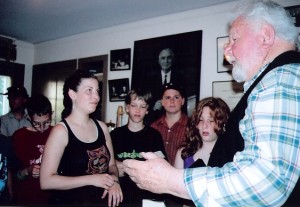
Ed Fadeley
In August we said goodbye to the Honorable Edward N. Fadeley or as we knew him “Ed”. He spearheaded efforts in the Oregon Legislature to obtain state funds to purchase the Morse farm so it could be protected and held in perpetuity for the people of Oregon. He was an impassioned supporter of efforts to make the Morse farm a tribute to principled politics. We will miss his input and have reached out to Darian Fadeley to rejoin our board as a member. A few of us attended his birthday party last December. Laura Olsen was with us. Sadly, she passed away just days later. Ed constantly reminded us of our mission to promote the legacy of Wayne Morse. Many of us attended both memorials. We plan to honor them both in a meaningful manner as a board in the near future.
2015 Guest Speakers
February
Bruce Chase, a longtime Morse family friend, offered Board Members a personal portrait of the family and the exciting times he shared with them. His mother and Mrs. Morse were friends, and he was included in Edgewood Farm activities. Nancy Morse and Bruce attended Roosevelt Junior High School and the University of Oregon together and were engaged for a short time.
Bruce drove for Wayne Morse for four years, going to the Oregon State Fair and taking one trip to the East Coast with the family’s horse trailer. The State Fair was a fun week with Bruce sometimes riding the horses to cool them down. For Bruce, Morse’s ability to handle a horse in the show ring seemed spectacular.
Often Bruce was asked to come along on Morse family journeys between Eugene and Washington, D.C. Travel at the time was slow because there were no interstate highways. The trips took five days, with a stop in Wisconsin to visit relatives. The Westchester Apartments in Washington, where the family lived at the time, amazed Bruce: It was a city inside one building with homes, grocery stores and movies. Morse was usually reading and studying. Bruce couldn’t figure out when Morse found time to sleep.
October
Gary Orfield, the current Morse Chair of Law and Politics at the University of Oregon, and Patricia Gandara, Visiting Distinguished Scholar, spoke to the Board about the future of public education. Orfield and Gandara are professors at UCLA and co-directors of its Civil Rights Project/Proyecto Derechos Civiles. Through the Project they have become major figures in equity education research. While at the UO, Orfield taught a course on race, law and education at the School of Law, and Gandara took over a course at the College of Education on immigration and education with a focus on language policy.
Their discussion addressed many dimensions of public education: equity education, civil rights, ethnic studies, increasing reliance on charter schools, internal segregation in schools and the drop out crisis, among others. They strive to find opportunities to affect change by linking their research with an entity which will use it in its work and by testifying or filing briefs in courts as well as participating in and organizing hearings.
In the course of Orfield’s comments about his work on education and civil rights, he highlighted a new book about the Johnson Administration’s record on education. During that period — while Wayne Morse was Chair of the Senate Education Subcommittee – twenty educational reforms were adopted. Since then educational reform has slowed, and the No Child Left Behind effort particularly has proved to be a disaster. A similar situation exists with affirmative action where we’ve gone backwards since the Reagan Administration, although a few fights continue such as the recent Supreme Court consideration of affirmative action.
Gandara’s book about bilingual advantage reported on research of the vast differences among students due to culture and the increased ability to prosper in today’s economy if one is biliterate not just bilingual. Today one in five students is Latino/a. Gandara feels Oregon is poised to contribute innovative approaches to addressing the educational needs of students who don’t speak English. Woodburn, Oregon, schools show great understanding of the importance of including cultural elements in their programs, building relationships with families, and making sure bicultural students don’t fall off academically. The district has reframed immigrant students from being English learners who need to be fixed to young persons who bring assets to this country and benefit everyone.
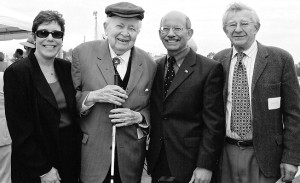
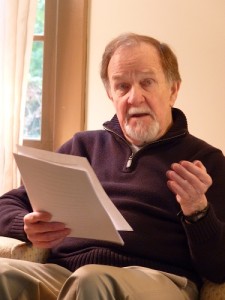
L-R: Groundbreaking for Wayne L. Morse Federal Courthouse, 2005: U.S. District Court Judge Ann Aiken, Monroe Sweetland, U.S. Representative Peter DeFazio, Moshe Lenske. Bill Robbins at WMHPC annual meeting, 2015.
2015 Annual Meeting Features Preview of Monroe Sweetland Biography
Bill Robbins, Emeritus Distinguished Professor of History at Oregon State University, was the featured speaker at the January 2015 Annual Corporation Meeting and Potluck. Robbins, biographer of Democratic Party activist and former WMHPC Board Member Monroe Sweetland, provided a “political travelogue” through 20th Century Oregon and national politics.
During the meeting that followed, Marlene Nesary was welcomed as the newest member of the WMHPC Board. Marlene is President of the City Club of Eugene and worked with the UO Wayne Morse Center on Law and Politics on its 2014 Wayne Morse Legacy Project. Bob Lee (President), Pat Reilly (Vice President), Harriet Behm (Secretary) and Larry Perry (Treasurer) were elected 2015 WMHPC Board officers.
Robbins admired Wayne Morse, his strength of character and his no-holds-barred opposition to the Vietnam War. He heard Morse speak at the University of Oregon early in 1965 when the Vietnam War was heating up and participated in the first Vietnam peace march on campus later that same year.
Robbins painted a portrait of Monroe’s personal and public life and shared Sweetland family photos and other memorabilia. He highlighted Monroe’s early life: born in Salem, Oregon, in 1910; raised in Michigan; studies at Whittenburg College and Cornell, Syracuse and Willamette Law Schools; marriage to Lillie McGrath, a fellow law student; and the birth of daughters Rebecca and Barbara. He explored Monroe’s lifelong passion for politics, from early support of the Socialist Party and work as a field organizer for the Student League for Industrial Democracy to eventually becoming Democratic Party National Committeeman from Oregon as well as a transformative force within the Party and serving 10 years in the Oregon State Legislature.
Monroe Sweetland’s life was defined by a remarkable diversity of interests and work: early assignments with the Oregon Commonwealth Federation in Portland, the wartime Office of Production Management and the Congress of Industrial Organizations War Relief Committee in Washington, D.C., and the American Red Cross in the Pacific theater during World War II; publisher of the Molalla Pioneer, Newport News, and Milwaukie Review newspapers; Western Regional Coordinator for the National Education Association; and founder of Western Wilderness Products, a company which distributed exotic plants and greenery. He established strong connections and friendships with national and state political, labor and education leaders.
His legacies include developing the concept for the federal Bilingual Education Act of 1968 which encouraged teaching English as a second language in districts with large non-English speaking enrollments; working for adoption of the 26th Amendment to the U.S. Constitution which lowered the voting age to 18, something he proposed for Oregon in the 1950s; and spearheading efforts in the Oregon Legislature to transform then Portland State College into an urban university.
Woven into Robbins’ presentation was Sweetland’s connection to Wayne Morse, with whom he began corresponding in the 1940’s. At the time Monroe was monitoring the struggle for control of the Democratic Party in Oregon, concerned that the party’s candidates in Oregon (and most western states) were receiving far less votes than the party’s incumbent President, Franklin Roosevelt. Morse had run for the U.S. Senate as a Republican in 1944, beating Democrat Rufus Holman, carrying more precincts than any candidate in previous Oregon history, receiving more votes than FDR and siphoning liberal Democratic voters away from the conservative Holman. Sweetland hoped Morse one day would become a Democrat as he did in 1955.
Morse and Sweetland later split on the issue of Vietnam and the 1966 U.S. Senate race between Democrat Robert Duncan who supported Lyndon Johnson’s Vietnam policies and Republican Mark Hatfield who opposed the war. Monroe firmly believed that Johnson and Humphrey could bring an end to the war.
Information about Professor Robbins’ book, A Man for All Seasons: Monroe Sweetland and the Liberal Paradox, can be found at http://osupress.oregonstate.edu/book/man-for-all-seasons.
Morse Fellows and Scholars Visit the Farm
Students from the Morse Law Fellows and Scholars programs at the University of Oregon – Erin Burris, Adrian Engstrom, Angela Rico and Chris Jirges – were guests at the WMHPC November Board meeting. Margaret Hallock, Director of the UO Morse Center for Law and Politics which sponsors the programs, outlined how each program functions and moderated a presentation by the students. Adrian, a senior, is in the inaugural class of undergraduate Morse Scholars. Erin, Angela and Chris are Law Fellows, studying at the Law School. Their impressive presentations and responses to Board Members’ questions spotlighted a strong commitment to carrying forward the Wayne Morse legacy. For information about the UO Morse Center and its student programs, check the Center’s website: http://waynemorsecenter.uoregon.edu.

Library Patrons Learn About Reading Books At Edgewood Farm
For the third year in a row, WMHPC participated in the annual summer children’s display program at the Eugene Public Library. Our 2014 display featured the Morse family’s love of reading. Library visitors learned how the three Morse daughters were taught to enjoy reading books at a very early age.
Senator and Mrs. Morse read to their daughters every evening in the large family living room where in the spring and summer they also gazed out the picture window that looked over the horse pastures below. In the colder autumn and winter months, the family lit fires in the fireplaces in the living room and music room where the girls would play. The family gathered at night to listen to the radio, visit with company and read together as a family. As the daughters got older, each one took turns reading out loud.
The girls also had a tree house in their wooded yard where they would play. Nancy, the oldest daughter, loved to climb into the tree house where she could have time alone and read. It was one of her favorite things to do!
For almost 80 years the Wayne Morse Family Farm has been a great place to relax with a good book!
Morse “War No More” Commemoration
On August 9, 2014 the Wayne Morse Family Farm hosted “War No More,” a collaborative community event celebrating the 50th anniversary of Wayne Morse’s courageous “No” vote opposing the Tonkin Gulf Resolution to send troops to Vietnam. The event included tours of the historic home featuring the political cartoons exhibit highlighting Senator Morse’s opposition to the Vietnam War, three educational teach-ins about the economic, spiritual, and psychological costs of war and the effects on veterans and their families and the war resistance by GIs, a fabulously fun “Celebrating Dissent Fashion Show” telling some of the story of the 1960s and expressing today‘s challenges that we face, along with music, poetry, a children’s peace flag art project, and ice cream.
Many thanks go to our guests, performers, sponsors, endorsers, and WMHPC board members: Community Alliance of Lane County (CALC), Wayne Morse Historical Park Corporation, WAND (Women’s Action for New Directions), Beyond War Northwest, Wayne Morse Center for Law and Politics, ESSN/jwj (Eugene-Springfield Solidarity Network/Jobs with Justice), Veterans for Peace Chapter 159, Eugene PeaceWorks, Eugene Peace Choir, and The Raging Grannies.
Captions, L-R: Scholarship Table, Teach-In, Civil Rights Movement intertwined with Anti-War Movement, Bomb Gown, Deep Pockets, Raging Grannies, Eugene Peace Choir, Sing-a-Long
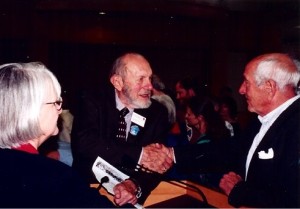
Remembering Kermit Rohde and Elinore Darland
In 2014 the WMHPC Board experienced the loss of two beloved and long serving Board Members, Kermit Rohde and Elinore Darland. Both Kermit and Elinore are greatly missed by their Board colleagues.
Kermit Rohde and his late wife, Barbara, were among the founding members of the WMHPC with Kermit serving as the Board’s first President from 1975 to 1978. They gave countless hours to developing the Morse family farm and home as an historic site and to finding ways to memorialize and pass along Wayne Morse’s legacy. For 30 years they drove down from Corvallis to monthly WMHPC Board meetings at Edgewood Farm, dedicated to our mission.
We are indebted to Kermit for his pioneering work on the Wayne Morse Integrity in Politics Award. A professor of social psychology at Oregon State University, Kermit called upon his extensive political, academic and World Federalist contacts when he developed and directed the selection process for the Award. He marshaled great interest and enthusiasm for this project which produced seven awards during his tenure.
Kermit was always the teacher, keeping Board Members abreast of debates on issues of the day. He had a deep commitment to the United Nations and peace. His activism was inspirational.
Kermit’s memorial service was held in Corvallis on August 16, 2014, with a large contingent of Board Members in attendance.
* * * * * * *
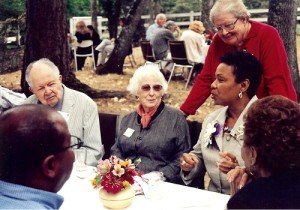
Elinore Darland was a respected and creative member of our Board. Her late husband, David, served as WMHPC Board President from 1993-1994. She lent her wonderful talents to the efforts to restore the Morse family home’s historical character and to produce exhibits which explored Wayne Morse’s legacy. To bring more art into the Morse home as Mildred Morse often did, Elinore commissioned and donated a painting in the style of one that had been in Morse apartment in Washington, D.C.
Until her passing in April, Elinore, a former English instructor and writer, was one we looked to for assistance with countless writing projects. Her most enduring effort was the research and writing she handled for the pavers and statue base at the Wayne Morse Free Speech Plaza.
Her August 23, 2014, memorial service was held at Edgewood Farm. Family, friends and fellow Board Members joined in recalling her life and her work in making the Morse family home come alive.
Candidate’s Forum 2012
The Wayne Morse Historical Park Corporation and the League of Women Voters co-hosted a Candidates’ Forum, featuring the Ward 2 race for Eugene City Council candidates, Betty Taylor and Juan Carlos Valle along with a Meet & Greet, and tours of the Morse family home on a beautiful afternoon on Sunday, September 9th. The well-attended event was held undercover (from the sun!) at the picnic shelter, and taped by Community Television of Lane County (www.CTV29.org). WMHPC board members assisted in the hosting, setup, collection of questions by the public, house tours and serving of refreshments. Thank you to all who helped on this wonderful community event.
Eugene’s 150th Celebration 2012
No celebration of Eugene’s history would be complete without deference to Wayne Lyman Morse. His granddaughter, and board member, Melanie Lee, gave a wonderful interview on “The Tiger of the Senate” for KVAL TV’s Tom Adams, as part of their series for Eugene’s 150th anniversary celebration. You can find the accompanying article and see her interview in this KVAL clip . The Register Guard also mentioned him in their special anniversary supplement edition in September – “Eugene@150,” as one of the local notable residents who made their mark on history. He is pictured at a speaking engagement in 1966, and noted as…”UO Law School dean in the 1930’s; legendary U.S. senator from 1945-1969; made brief run at U.S. presidency in 1960.” Earlier this year, Melanie gave another great interview to the RG in preparation for this anniversary. KUDOS, Melanie!
Bob Kuttner Reminisces About Wayne Morse 2012
Kuttner paid a visit to the Morse Family Farm to view the exhibits and talk with the Wayne Morse Historical Park Board about politics and economics in 2012. He began by remembering how important it was for Senator Wayne Morse to stand up to Lyndon B. Johnson, a President of the same party, with whom Morse was aligned on many issues. In fact, Wayne Morse carried Johnson’s Great Society programs that had to do with education. (See the monograph by Morse biographer A. Robert Smith, A Triumph of Statesmanship: Senator Wayne Morse Delivers Federal Aid for Education, published by the Wayne Morse Center for Law and Politics and the Wayne Morse Historical Park Board in 2011.)
But despite his support of Johnson’s programs on civil rights and social progress, Wayne Morse was a vocal and constant dissenter against the disastrous course Johnson set in Southeast Asia. Morse was one of two votes against the infamous Gulf of Tonkin Resolution in 1964 that, according to Morse, gave a blank check to Johnson to expand U.S. involvement in Vietnam.
Kuttner hopes that someone will stand up for more progressive economic policy. He complimented Oregon Senator Jeff Merkley for improving the Frank-Dodd legislation that reformed the financial sector after the 2008 collapse, but we need to go further. President Obama seems set on a course of compromise with the ‘budget deficit hawks.’ Kuttner believes there is no way we can immediately cut the deficit without hurting workers, seniors and the poor. It would be a disaster, in his opinion, to reduce Social Security or Medicare benefits. The people who need it most cannot cope easily with higher eligibility age for these programs, as they have worked in demanding jobs and have no other means of support. There are better ways to deal with budget deficits in the future – for now we must get the economy back on track by investing in infrastructure, especially renewable energy and green jobs.
Robert Kuttner’s visit to Oregon was spectacular. He gave three public addresses in Eugene and two in Portland, focusing on economics and politics. He co-taught a political science class with Dan Tichenor, Senior Faculty Fellow at the Wayne Morse Center. Over 80 sophomores were treated to a rich class on Public Policy and Democracy. At the last class we were sure that Bob had some Oregon gear to take back to Boston.
OPB’s “Oregon Experience: Wayne Morse” Previews in Eugene 2012
Oregon Public Broadcasting aired a retrospective about Wayne Morse’s life in February 2012 as part of its “Oregon Experience” series. Prior to the broadcast, WMHPC and the Wayne Morse Center for Law and Politics cosponsored previews in Eugene. OE Executive Producer Nadine Jelsing and segment Producer Eric Cain attended the screenings, held at the UO Knight Law Center.
The production drew heavily on research conducted in Eugene during summer 2011 at the Morse family farm and the UO Library’s Special Collections which houses Wayne Morse’s papers. Excerpts from interviews with WMHPC Board Members Ed Fadeley and Melanie Lee, Senator Morse’s granddaughter, and UO Morse Center Director Margaret Hallock appear in the production, in addition to those with former Morse staffer (and WMHPC Life Member) Gina Harden and long time campaign staffer Ron Abell who sadly passed away shortly before the production was aired.
“Oregon Experience: Wayne Morse” provides a “fresh look” at Wayne Morse who “…often stood apart from the crowd on the issues…and his vote was never for sale.” Producer Cain added, “Morse was a complicated and fascinating man. Many Oregonians today don’t remember much about him, if they remember him at all. But here was a man who insisted that a democracy can succeed only if its citizens have access to the facts. He believed that government plays an important role in protecting people’s rights and freedoms.”
Watch OREGON EXPERIENCE: WAYNE MORSE online anytime after the broadcast at watch.opb.org
Annual Meeting 2011 Special Guest: Daniel Hosang
At our January 2011 annual meeting, Dr. Daniel HoSang, UO Assistant Professor of Political Science and Ethnic Studies, gave a compelling presentation titled “Race on the Ballot in California and Oregon.” Dan HoSang was a Resident Scholar at the Wayne Morse Center for Law and Politics while he was finishing his important book Racial Propositions in which HoSang looks beyond the headlines to uncover the history of California’s ballot measures over the past fifty years.
HoSang shows that liberal communities will actually support conservative ballot measures, and he discussed his interest in the connection between political extremism and violence. HoSang grew up on the upper West side of NYC and was struck by the idea that a place can have liberal values and still accommodate a lot of oppression and hierarchy.
The book jacket for Racial Propositions describes HoSang’s work as follows:
As the rest of the U.S. watched, California voters banned public services for undocumented immigrants, repealed public affirmative action programs, and outlawed bilingual education, among other measures. Why did a state with a liberal political culture, an increasingly diverse populace, and a well-organized civil rights leadership roll back civil rights and anti-discrimination gains? Daniel Martinez HoSang finds that, contrary to popular perception, this phenomenon does not represent a new wave of “color-blind” policies, nor is a triumph of racial conservatism. Instead, in a book that goes beyond the conservative-liberal divide, HoSang uncovers surprising connections between the right and left that reveal how racial inequality has endured, arguing that each of these measures was a proposition about the meaning of race and racism.
HoSang discussed many of the ballot measures that passed in California in the name of liberalism but that did not actually promote equality. An early example is Proposition 14. In the election of 1964, California voted overwhelmingly for Lyndon Johnson, but voted 2 to 1 to make housing discrimination legal. Dr. HoSang showed newspaper ads stating discrimination. There was violence towards people of color who wanted to move into segregated neighborhoods. Willie Mays couldn’t buy a house in San Francisco. HoSang emphasized the problematic and contradictory phenomenon that people say they want to be open to everyone, but they also say property owners have the right to do what they want. That perspective is addressed to white voters, because the only people who would see these as actual rights would be white; blacks would not see it as a right. The center of the argument is the idea of “your” rights – who is being talked about here with the statement “you”? Pat Brown led a fight against Prop 14. His message was to not legalize hate. The California Council of Churches told members they didn’t have to worry because “other” people couldn’t afford to live where those church members lived and the ones who could afford to come in were high quality and professional.
“Tolerance” and “Political Whiteness” on the ballot produces “our” statements with racial implications: “our rights of association,” “our property rights,” “our school,” “our kids,” our language,” “our common heritage,” “our borders,“ “our rights of fairness.” We are fortunate to have had Dr. HoSang discuss these serious and timely topics, inspiring us, and no doubt many others, to explore, discuss and participate in community and national change.
For more information about Dr. HoSang, and his publications, please visit:
UO Department of Ethnic Studies

